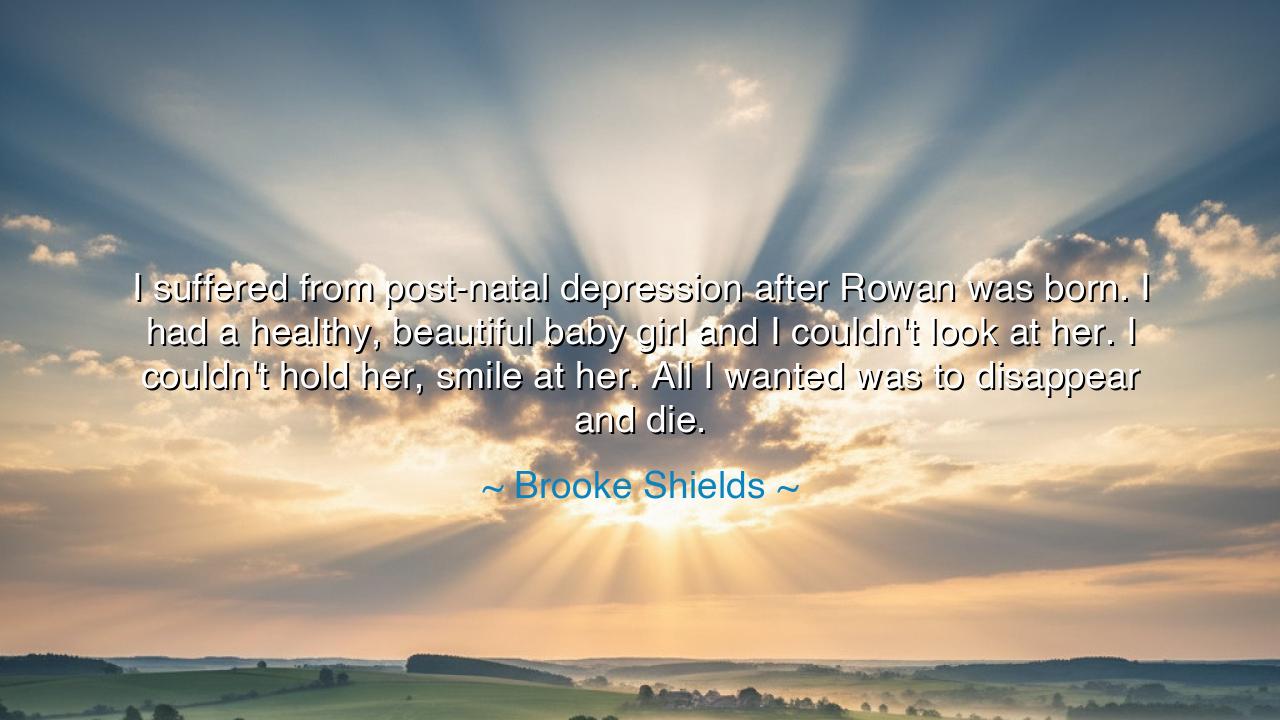
I suffered from post-natal depression after Rowan was born. I had
I suffered from post-natal depression after Rowan was born. I had a healthy, beautiful baby girl and I couldn't look at her. I couldn't hold her, smile at her. All I wanted was to disappear and die.






The words of Brooke Shields fall upon the heart like a heavy bell tolling at dawn: “I suffered from post-natal depression after Rowan was born. I had a healthy, beautiful baby girl and I couldn’t look at her. I couldn’t hold her, smile at her. All I wanted was to disappear and die.” These are not the words of weakness, but of terrible honesty. They unveil a truth long hidden in shadows—the battle that some mothers face when, after bringing forth life, they themselves are plunged into darkness. In her confession is no shame, but a heroic act of breaking silence, that others may know they are not alone.
To have a baby is to step into the ancient mystery of creation. Across all time, mothers have been revered as bringers of life, their faces carved into temples, their arms painted in frescoes as the guardians of new generations. Yet the world, dazzled by the miracle of birth, often turns away from the reality that birth can wound as well as bless. Brooke Shields’ words tear away the veil: even with a healthy child, a mother may be overcome by sorrow, alienation, and despair. The body may heal while the spirit bleeds unseen.
This is the nature of post-natal depression, a darkness that descends precisely when the world expects light. The mother holds life in her arms, yet feels empty herself; she gazes upon her child, yet feels no connection. Such a condition was not unknown to the ancients, though they lacked a name for it. In the writings of Hippocrates and Soranus of Ephesus, we find accounts of mothers who, after childbirth, were struck by melancholy, by thoughts of fleeing, even by visions of death. They, too, walked the path Brooke describes—a path that feels like failure, but is in truth an illness.
History offers examples of this quiet struggle. Consider Queen Marie of Denmark, who in the nineteenth century suffered severe melancholy after childbirth, withdrawing from her family and court. She was judged harshly by those who could not understand her silence, yet we know now that she bore the weight of what we call post-natal depression. Her plight, like Brooke Shields’, teaches us that this darkness spares neither the humble nor the exalted. It is no sign of unfitness or sin, but a cruel affliction that must be met with care and compassion.
Brooke’s words are also a testament of survival. Though she speaks of wanting to disappear and die, she did not. By naming her pain, by bringing it into the light, she transformed it from a private torment into a public witness. In doing so, she became a champion for countless women who, silent and ashamed, believed they alone suffered. Her voice reminds us that confession is not weakness but courage, and that healing begins with truth.
The lesson for us is clear: we must create a world where mothers are not left to suffer in silence. We must listen without judgment when they say, “I cannot smile at my child.” We must understand that such words do not signal lack of love, but the crushing weight of illness. And we must ensure that help is not only offered but insisted upon, that no one who brings life into the world feels they must carry their pain alone.
Therefore, let us take practical action. If you are a parent or friend, watch for signs of despair in the new mothers around you. Offer your presence, your patience, your reassurance. If you are yourself walking through this darkness, remember Brooke Shields’ words and know that you are not alone. Seek support, speak your truth, and cling to the hope that this is not the end but a passing storm.
Thus, from Brooke Shields’ brave confession rises an enduring wisdom: that even in the most celebrated moments of life, shadows may fall; that even in the act of giving life, one may feel lifeless. But by naming the darkness, by reaching out, and by receiving compassion, the smile may one day return—not as a mask, but as a sign of healing and hope. This is the lesson we must pass on: life is not only about bringing forth light, but about learning to guide one another through the night.






AAdministratorAdministrator
Welcome, honored guests. Please leave a comment, we will respond soon